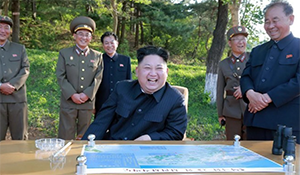Western Pacific Regional Dynamics & North Korean Nuclear Status
Published:
2018
| Updated on
August 15, 2025

Associated SMA Project
No items found.

Authors: Dr. Allison Astorino-Courtois (NSI, Inc.) and Dr. Belinda Bragg (NSI, Inc.)
This publication was released as part of SMA’s Strategic Outcomes in the Korean Peninsula project. For more information regarding this project, please click here.
Executive Summary
Given the current distribution of actor interests, capabilities and resolve (I-R-C), North Korean denuclearization is highly unlikely without significant change in regional interests and conditions. Under current conditions:
- Neither economic incentives nor threats change the DPRK view of denuclearization –an outcome it can veto.
- I-R-C analysis demonstrates that achieving final and fully-verified denuclearization (FFVD) would require the Kim regime to agree to a path that is detrimental to multiple of its political, security and economic interests. Neither offers of economic and diplomatic rewards (carrots), nor threats of increased regional tension or US military action (sticks) is sufficient to change the North Korean decision calculus enough to make denuclearization appear acceptable from the perspective of the Kim regime. Moreover, North Korea is the single actor with the power to veto denuclearization, i.e., stalling or half-steps result in de facto international acceptance of its nuclear status.
- China is both incentivized and has the ability to undermine FFVD.
- The I-R-C analysis shows both China’s and North Korea’s interests to be better served by
moderate regional tension (as in the pre-summit status quo) than by a US, or South Korean-brokered FFVD. Both also gain more by a drawn-out process of US-DPRK talks that reduce regional tensions but do not make progress on denuclearization. The I-R-C indicates that China’s incentive to undermine FFVD is driven by its interests in gaining regional influence.
- The I-R-C analysis shows both China’s and North Korea’s interests to be better served by
- A US-brokered FFVD of North Korea would require change in core US, Chinese, Russian and DPRK threat perceptions and worldviews.
- US, Russia and China all to prioritize engagement and economic assistance to North Korea (DPRK) over increasing their own regional influence; a broader strategic goal of each.
- Kim regime to radically alter one of its basis for legitimacy away from protecting North Korea from existential threats (through nuclear capability and economic self- sufficiency), toward provision of economic growth and development.
The current US approach to regional leadership may be out-of-touch with regional interests.
- For regional actors, denuclearization is not primarily about security, but about regional stability and influence.
- While no regional actor (other than the DPRK) particularly wants to see a nuclear DPRK, most do not consider DPRK nuclear weapons to be a pressing national security issue or threat. The main DPRK-related threats to regional stability are indirect and have more to do with how others like Japan and the US would respond to North Korean provocations. In fact, concern for their future influence in regional affairs is what drives most regional actors’ preferences with regard to the DPRK nuclear issue. For China and Russia this means containing US regional influence and expanding their own. For South Korea, Australia, and Japan preferences over the issue are driven by their common interests in taking on larger roles in regional security achieved by rules-based multilateral diplomacy.
- Multilateral solutions to regional issues are preferred region-wide.
- he increasingly unilateral US approach to regional issues (such as DPRK
denuclearization) conflicts with the preference of most regional states to work multilaterally and through international law to resolve disputes and increase stability.
- he increasingly unilateral US approach to regional issues (such as DPRK
The success of US efforts to balance China in security matters facilitates growth of Chinese regional influence at the expense of the US.
- China’s strategy of regional economic expansion is a major source of its regional influence which in turn, ensures its own domestic stability and regime legitimacy. Historic US security relationships guarantees, together with regional suspicion of China and Japan have been major source of US regional influence relative to that of China.
- China’s economic growth and influence depends on regional stability, which is reinforced by US security guarantees and assurance of allies suspicious of Chinese intentions. As the region becomes more secure, it becomes more stable. Stability allows states to prioritize economic growth and prosperity. Over time, US security and extended deterrence relationships become less important for insuring a safe and stable region.
How the US approaches this issue may be equally important for its long-term regional interests and influence than whether an agreement on denuclearization is actually achieved.
- For most regional actors, heightened tension and competition for influence between the US and China is a greater threat to their interests than the failure to reach an agreement on DPRK denuclearization.
- US allies and smaller states interests will inevitably be compromised if they are forced to chose between China (critical to their economic interests), and the US (preferred security partner).
- Engaging regional actors through multilateral negotiations would reduce concern over US regional commitment and signal US recognition of the preferences and constraints facing smaller regional states. It would also make it more difficult for China and Russia to act as spoilers than does a bilateral approach.
This publication was released as part of SMA’s Strategic Outcomes in the Korean Peninsula project. For more information regarding this project, please click here.
No items found.
National Security Topic
No items found.


